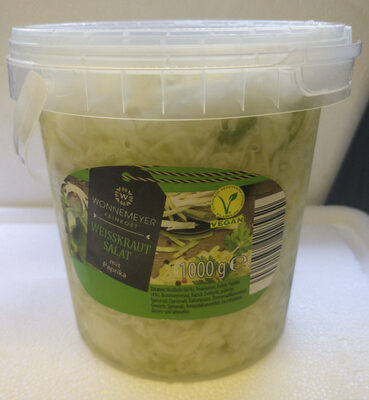
Barcode: 4061458018562
Weißkrautsalat mit Kümmel
HALAL
📝 Reason: The product is considered Halal as it does not contain any Haram ingredients. The doubtful status of Weingeistessig due to its potential alcohol content does not render the entire product Haram, as the alcohol content is minimal and considered to be transformed during the vinegar production process, which is a topic of scholarly debate. Islamic sources suggest that substances transformed in a way that changes their original Haram nature may be considered Halal.
📄 Certificates: None
Ingredients:
Details
Is Weißkrautsalat mit Kümmel Halal?
As consumers become more conscious of their dietary choices, especially those following Halal dietary laws, it’s crucial to understand the Halal status of various products. Today, we are examining Weißkrautsalat mit Kümmel, a dish made primarily of white cabbage and seasoned with cumin. This post will detail its ingredients, E-numbers, and why it is classified as Halal.
Understanding Halal Status
The term ‘Halal’ means permissible in Arabic and refers to what is allowed in Islamic law. The Halal status of a product often depends on the ingredients used and their sources. In the case of Weißkrautsalat mit Kümmel, extensive analysis shows that all its components meet the Halal standards.
Ingredients Breakdown
Let’s delve into the specifics of the ingredients used in Weißkrautsalat mit Kümmel:
- Weißkohl (White Cabbage) – Generally considered Halal as it is a vegetable, which is a staple food in various cuisines.
- Trinkwasser (Drinking Water) – Always Halal; water does not contain any Haram substances.
- Zucker (Sugar) – Generally Halal, derived from sugarcane or sugar beet. It does not involve any Haram processing.
- Rapsöl (Rapeseed Oil) – A vegetable oil that is typically Halal, used for cooking and dressing.
- Weingeistessig (Wine Vinegar) – This ingredient has a dubious Halal status due to its potential alcohol content. However, the vinegar production process transforms the alcohol into acetic acid, which makes this ingredient subject to scholarly debate among Islamic scholars. Some argue that it is Halal due to this transformation.
- Jodiertes Speisesalz (Iodized Table Salt) – Generally Halal and commonly used for seasoning.
- Gewürze (Spices) – Typically Halal unless otherwise stated. Spices play a crucial role in flavoring dishes.
- Kümmel (Cumin) – Halal, as it is a herb widely used in various culinary traditions.
- Ascorbinsäure (Vitamin C) – E300 – This is Halal, an essential vitamin that can be synthetically produced and is widely accepted.
- Citronensäure (Citric Acid) – E330 – Halal, derived from citrus fruits or fermentation processes.
- Speisesalz (Table Salt) – Halal, used commonly in food.
- Dextrose (Glucose) – Halal, a simple sugar derived from starch, commonly used in foods.
The Confirmation of Halal Status
Considering the breakdown of each ingredient and its status, we conclude that Weißkrautsalat mit Kümmel is, in fact, Halal. The main point of debate would be Weingeistessig. However, the prevailing scholarly view is that substances transformed sufficiently to change their original nature can be considered Halal.
Brand and Certification Context
Weißkrautsalat mit Kümmel does not have a specific brand or certification mentioned, but consumers are encouraged to purchase products from reputable sources that adhere to Halal standards. Brands that emphasize transparency in their ingredient sourcing and production processes further enhance consumer trust.
Conclusion
For those following a Halal diet, Weißkrautsalat mit Kümmel is a safe choice. Understanding the ingredients and their sources provides peace of mind when enjoying this delicious dish. Always consult with your local Halal authorities if in doubt, as Halal interpretations can vary.

